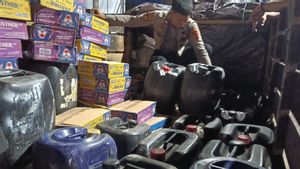JAKARTA - Head of the National Food Agency (NFA) Arief Prasetyo Adi explained that demurrage is a common thing in export-import activities. There are several factors that can cause delays in loading and unloading and that is common, so it can be taken into account by business to business (B2B).
"Regarding demurrage, it will be the most appropriate to answer the President Director of Bulog, because the demurrage has not been completed, including shipping lines, there is insurance, for import exports it is normal. So when people export or import, it could be because it is raining or other things, so they cannot be dismantled," explained Arief while attending the Commission IV Working Meeting of the DPR RI with the Minister of Agriculture in Jakarta, on Thursday, June 20.
Furthermore, the President Director of Perum Bulog Bayu Krisnamurthi added that the demurrage was a fee that arose due to delays in loading and unloading at the port.
"This is a normal thing. So, for example, it is scheduled to (load up) for 5 days, so it is 7 days. Maybe because it rains, maybe because the port is full and so on," he said.
"Demurrage is a cost that is part of the costs that must have been calculated in import export activities. How exactly, it is still being calculated, because there are negotiations, for example which ones can be covered in insurance, which ones are not, which ones are responsible for shipping. So the existence of demurrage costs is something that can be said to be part of the logical consequences of export-import activities," he continued.
"We always try to minimize the cost of demurrage. Our demurrage costs are still calculated and we were still negotiating. So the final figure has not been completed, but the estimate is that when compared to the value of imported products, maybe God willing, it will not be more than 3 percent," concluded Bayu.
After the meeting, the Head of NFA Arief Prasetyo Adi reiterated that the position of the National Food Agency was the party who assigned Bulog.
"Demurrage is a normal thing. It's just a matter of looking at it, whether it's because of rain, it was supposed to be 6 days, so it could take 7 or 8 days. That's a normal thing in business to business as usual," explained Arief.
"So the National Food Agency assigned Bulog according to the results of the Ratas (Limited Meeting). Then the Bulog did B2B. The orders, those who import, who distribute it are Bulog. This is purely imported. That's why in the Commission IV meeting, I invite the President Director of Bulog to explain because the one who understands the most is the Bulog board of directors," he said.
SEE ALSO:
Furthermore, the Head of NFA Arief Prasetyo Adi gave certainty that the total rice stock managed by Bulog was in a safe and sufficient position. With the current total of 1.7 million tons and will continue to increase along with the absorption of domestic production, Arief believes that all government intervention programs for the community can be carried out properly.
"As of mid-June, Bulog has consistently absorbed domestic production and a total of almost 700 thousand tons. Bulog is moving to do that through excellent programs. There is a Gabah pick-up program, the Mitra Farmers' program, and the Makmur program. With this, it can be seen that the government is very focused on strengthening stock, especially to save rice as CPP (Government Food Reserve)," he concluded.
The English, Chinese, Japanese, Arabic, and French versions are automatically generated by the AI. So there may still be inaccuracies in translating, please always see Indonesian as our main language. (system supported by DigitalSiber.id)
















